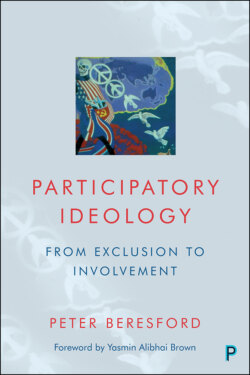Читать книгу Participatory Ideology - Beresford Peter - Страница 8
На сайте Литреса книга снята с продажи.
ОглавлениеForeword
Yasmin Alibhai-Brown
Journalist, author and professor, Middlesex University
Ideologies vary and are, by definition, conflictual and defined by real or imagined enemies. They are divisive, demanding, enclosed and tribal. It is important to note, however, that even the most divergent are identical in the way they frame reality and fuel up on certainties. Anyone who has been to gatherings of single-minded activists knows this well. To query statements, make critical enquiries or express doubts is considered blasphemous. I have often emerged from these, not glowing with participatory validation, but feeling gagged and misrepresented. Over the years I have been damned as not left-wing enough, not black enough, not Muslim enough, not British enough.
And yet, without underpinning political and economic ideologies, democracies and societies would become fatally atomised and individualised. We see some of this today in the United Kingdom when voters complain that their particular preferences are ‘being ignored’ by ‘elites’. I even had one reader of my columns write to me: ‘I didn’t fucking vote for people like you to come to my country. So why are you here?’ The competition between capitalism and socialism, Labour and the Tories, faith and atheism, nationalism and internationalism keeps open societies dynamic and interactional. That we had the right, left and centre all committed to established rules of conduct in politics made for stability and continuity.
In a representative democracy, the majority elect the government, which is then expected to govern fairly and rationally, make evidence-based policies – even if unpopular – and look after the interests of the nation. For example, ever since the Empire Windrush docked at Tilbury Docks in June 1948, a sizable proportion of Britons have opposed ‘coloured’ migration. Yet every government since then has talked the anti-immigrant talk, but has not fully respected this will of the people because of economic imperatives. So, the angry chap above was right – people like him never wanted people like me in ‘their’ country. Their views did not, could not, prevail. The system is like a hanging mobile, maintaining a careful balance between government, parliament, the media and the people. That delicate balance has been destabilised since 2016. Disruption has been injected into the body politic.
Since the start of the Brexit battles, we have seen new ideologies fighting it out; populism and nationalism versus cosmopolitanism and social/economic liberalism. The latter is losing the battle. Nigel Farage whipped up an emotional storm in the hearts of Britons who felt they were ignored and marginalised. Citizen participation coming out of a sense of grievance, exploited by manipulative and unethical leaders, does not lead to benign outcomes.
The problem is not that the elites don’t listen. It’s that for most of the past quarter of a century, politicians have prioritised the upper and middle classes. In this class-ridden country, the poor and powerless have been rendered poorer and more powerless by the proponents of neoliberalism, from Thatcher, through Blair, Nick Clegg and David Cameron, to the right-wing cabal now in charge.
The fall of communism led to further hubris in the Anglosphere. Francis Fukuyama pronounced the end of history (1989). Western cutthroat capitalism was seen and sold as the only way to human progress.
The market was turned into an established religion; privileging the privileged, planned inequality its central tenet. Winners had it all, and there would be a trickle-down effect to benefit losers.
Extreme poverty was indeed reduced, but from the inhumanely low base of $1.90 per day per person. According to the World Bank, ‘Fewer people are living in extreme poverty around the world, but the decline in poverty rates has slowed, raising concerns about achieving the goal of ending poverty by 2030 and pointing to the need for increased pro-poor investments.’ The number of super-billionaires grows and welfare budgets are savagely cut, year on year. Neoliberalism has corrupted capitalism itself and has been spread around the world with impunity. Today the super-rich in Mumbai, Lagos, New York and London are comrades, socio-political brothers and sisters with a manic commitment to small states and minimal taxation for the richest, power and influence without responsibility.
Those at the receiving end are under tremendous pressure and understandably blame politicians, the ‘undeserving’, most of all foreigners. That leads to participation based on resentment and, sometimes, hate, and a drift into the orbs of UKIP and its satellites.
How can divisive, mournful and reactionary participation be turned into a truly effective counterforce to the ideologies of neoliberalism, neofascism and neonationalism?
This book begins to explore those big questions. It provides invaluable analysis and opens up possibilities in these darkly pessimistic times.
#MeToo, Black Lives Matter and Extinction Rebellion went global because they meant something to and roused millions of men, women and children around the world. All the movements originated in the West – just as neoliberal capitalism did – but they were moral causes which shook people out of debilitating passivity. That new energy cannot be disregarded by politicians, business, the media or other sectors. It shows that when diverse peoples come together for a common cause, find their voices and get engaged, they do change the world.
Peter Beresford is onto something big.
